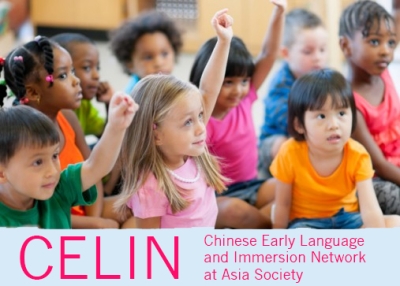Organizations Supporting Language Learning

A number of organizations support language learning, including Chinese early language and immersion education. While each one has its distinct mission, they offer a wide range of activities such as providing resources and connections, holding conferences and professional development for teachers, or documenting program information in searchable databases. These organizations are listed here, with a link to their website.
If you know of other organizations that it is helpful to include, please let us know!
American Council on the Teaching of Foreign Languages (ACTFL)
http://www.actfl.org
ACTFL, an international membership organization, is dedicated to the improvement and expansion of the teaching and learning of all languages other than English at all levels of instruction. Numerous resources are on their website, and they hold an annual convention in November.
Asia Society
http://asiasociety.org/education
Asia Society’s China Learning Initiatives play a pioneering role in the development of high-quality Chinese language programs in the United States and have worked with partners and schools across the country and in China to build and improve the field of Chinese language learning. Initiatives include the Chinese Early Language and Immersion Network (CELIN); Confucius Classrooms Network; newsletter, online resources, and publications; and an annual National Chinese Language Conference, organized in partnership with the College Board.
Association of Two-Way and Dual Language Education (ATDLE)
http://atdle.org
ATDLE facilitates collaborations among those working in two-way and bilingual/dual language immersion education. They hold an annual two-way immersion conference.
California Association for Bilingual Education (CABE)
http://www.bilingualeducation.org
CABE is a membership organization that advocates for bilingualism in California and across the United States. Their website features many resources and a video on the benefits of being bilingual, and they publish the Multilingual Educator.
Californians Together
http://sealofbiliteracy.org/
Californians Together, in collaboration with Velazquez Press, sponsors the Seal of Biliteracy, an award given by a school, school district, or county office of education in recognition of students who have studied and attained proficiency in two or more languages by high school graduation. The purpose of the Seal is to help students recognize the value of their academic success and see the tangible benefits of being bilingual.
Center for Advanced Research on Language Acquisition (CARLA)
http://www.carla.umn.edu/
CARLA is one of the U.S. Department of Education's Title VI National Language Resource Centers (http://www.carla.umn.edu/about/lrc/LRClinks.html), whose role is to improve the nation's capacity to teach and learn foreign languages. CARLA engages in a number of research and program initiatives related to second language teaching, learning, and assessment; supports the professional development of second language teachers through an annual summer institute program and a wide array of regional workshops and international conferences; and provides research-based professional development resources and practical instructional materials. CARLA’s searchable database of programs for learning less commonly taught languages (including Chinese) lists course offerings at colleges and universities, K-12 programs, distance education courses, study abroad programs, and summer language courses. http://www.carla.umn.edu/lctl
Center for Applied Linguistics (CAL)
http://www.cal.org
The mission of the Center for Applied Linguistics (CAL) is to promote language learning and cultural understanding by serving as a trusted source for research, resources, and policy analysis. Through its work, CAL seeks solutions to issues involving language and culture as they relate to access and equity in education and society around the globe. To learn more, visit the Community and Heritage Language Education section of the CAL Website and the Resource Center to browse related databases and directories.
Chinese Early Language and Immersion Network (CELIN) at Asia Society
http://asiasociety.org/celin
CELIN was established to strengthen and expand Chinese language education in early childhood, primary grades, and immersion programs. With a focus on Chinese language education, it convenes and works together with practitioners, researchers, policy makers, parents, and advocates for language learning across the United States and beyond.
Chinese Heritage Language Education and Research Project (CHLER)
http://www.cheler.org/index/SchSearch.aspx
This project, at the University of Toledo, has developed a searchable database of Chinese heritage language programs across the United States.
Chinese Language Association of Secondary-Elementary Schools (CLASS)
http://classk12.org/index.html
CLASS, a membership organization, was established to promote the teaching and learning of Chinese at elementary and secondary school levels and to bring Chinese language education into the mainstream of foreign language curriculum in American schools.
Chinese Language Teachers Association (CLTA)
http://clta-us.org/about-clta
CLTA, established in 1962, is a professional organization devoted to the study of Chinese language, culture, and pedagogy. Membership includes specialists in Chinese language, literature, linguistics, and culture teaching at colleges and universities throughout the world; teachers of Chinese at primary and secondary schools and community schools; and students of the language. CLTA publishes peer-reviewed journals and other types of publications and holds annual meetings.
Chinese School Association in the United States (CSAUS)
http://www.csaus.net/join12.asp
CSAUS brings together Chinese heritage language schools across the United States to promote collaboration and excellence.
Council of Chief State School Officers (CCSSO)
http://www.ccsso.org
CCSSO leads and facilitates collective state action to transform the U.S. public education system in four strategic areas: Educator Workforce; Information Systems and Research; Next Generation Learners; and Standards, Assessment, and Accountability. This work guides and supports the work of Chinese language programs.
Joint National Committee for Languages (JNCL-NCLIS)
http://www.languagepolicy.org
JNCL-NCLIS represents the language profession to the United States. The mission of JNCL-NCLIS is to ensure that Americans have the opportunity to learn English and at least one other language, advance the language profession in the United States, and raise awareness of the importance of language and international education to the national interest. It advocates to shape national policy for foreign language and international education and to raise the profile of the language enterprise.
Language Flagship
http://www.thelanguageflagship.org
The Language Flagship, funded by the U.S. government, sponsors 27 programs at 23 universities in a number of languages, including Chinese. Flagship programs provide tutoring for students, content-based instruction across disciplines, immersion learning opportunities, cultural events, and a certificate for professional level proficiency, "Flagship Certification."
Literacy in Learning Exchange
http://www.literacyinlearningexchange.org
The Literacy in Learning Exchange, designed to bring together researchers working in language education, is sponsored by the National Center for Literacy Education (NCLE, http://www.ncte.org/ncle), a coalition of stakeholders who represent the premiere education organizations, policy analysts, researchers, and foundations working together to identify and share the plans, practices, support systems, and assessments used by educator teams working to improve literacy learning.
National Association for Bilingual Education (NABE)
http://www.nabe.org
NABE is a strong advocacy organization in Washington, DC, focused on issues of language and culture in the United States. NABE holds an annual convention in March.
National Association of District Supervisors of Foreign Languages (NADSFL)
http://www.nadsfl.org
NADSFL’s mission is to promote excellence in foreign language education for all learners through professional development of foreign language supervisors. NADSFL supports supervisors by facilitating member networking and communication; promoting knowledge of current initiatives, trends and research; and encouraging advocacy for foreign language learning at all levels. NADSFL holds an annual summer academy and an annual meeting.
National Capitol Language Resource Center (NCLRC)
http://www.nclrc.org
The NCLRC is one of the U.S. Department of Education's Title VI National Language Resource Centers (http://www.carla.umn.edu/about/lrc/LRClinks.html), whose role is to improve the nation's capacity to teach and learn foreign languages. The NCLRC hosts summer institutes for teachers and provides a number of publications on their website.
National Center for Literacy Education (NCLE)
http://www.ncte.org/ncle
The NCLE is a coalition of stakeholders who represent the premiere education organizations, policy analysts, researchers, and foundations working together to identify and share the plans, practices, support systems, and assessments used by educator teams working to improve literacy learning. One of their projects is the Literacy in Learning Exchange (http://www.literacyinlearningexchange.org), which brings together educators working in language education.
National Chinese Language and Culture Coalition (NCLCC)
http://nclcc.nealrc.org/
NCLCC consists of three national organizations: Chinese Language Association of Secondary/Elementary Schools (CLASS), Chinese Schools Association in the United States (CSAUS), and National Council of Associations of Chinese Language Schools (NCACLS). NCLCC is launching a national campaign to mainstream Chinese language and culture education, with the goals of enhancing teacher training, expanding study abroad programs, increasing enrollments of learners of Chinese, and employing modern technologies in teaching and research.
National Council of Associations of Chinese Language Schools (NCACLS)
http://www.ncacls.org/ncacls_introduction.htm
NCLAS brings together Chinese heritage language schools across the United States to promote collaboration and excellence. Its members include 14 regional associations of Chinese heritage language schools.
National Council of Organizations of Less Commonly Taught Languages (NCOLCTL)
http://www.ncolctl.org
NCOLCTL addresses issues of national capacity in the Less Commonly Taught Languages (LCTL’s) by facilitating communication among member organizations and with the government, private, heritage, and overseas sectors of the language community, with the goal of increasing the collective impact of LCTL constituencies on America’s ability to communicate with peoples from all parts of the world.
National Council of State Supervisors for Languages (NCSSFL)
http://www.ncssfl.org
NCSSFL’s constituents are education agency personnel from all U.S. states who have responsibility for foreign/world language education at the state level. NCSSFL’s mission is to provide leadership in facilitating and promoting policies and practices that support language education and to affect state and national policy and practice in language education by identifying and advocating for specific positions on key issues that affect the language field; collaborating with other organizations to advance and support quality teaching, learning and leadership; communicating best practices across international borders; and fostering and promoting establishment, maintenance, and effectiveness of state-level positions on languages.
National Dual Language Consortium (NDLC)
http://www.dual-language.org
The consortium consists of member organizations and dual language researchers who conduct research, provide training and services for dual language practitioners, and disseminate information about dual language to a wide audience. The goal of dual language programs is that students are able to read, write, speak, and perform academically in two languages.
National Foreign Language Center (NFLC)
http://www.nflc.org
The NFLC is dedicated to promoting a language-competent society by developing and disseminating information that informs policy makers. Its mission is to improve the capacity of U.S. residents and citizens to communicate in languages other than English. The NFLC runs the STARTALK program (https://startalk.umd.edu), which provides language-focused summer institutes for students and teachers, on “critical languages,” including Chinese. NFLC also develops and hosts materials in a wide array of world languages, intended to help adult professionals to maintain and improve their skills in those languages.
National Heritage Language Resource Center (NHLRC)
http://www.nhlrc.ucla.edu/nhlrc
The NHLRC is one of the U.S. Department of Education's Title VI National Language Resource Centers (http://www.carla.umn.edu/about/lrc/LRClinks.html), whose role is to improve the nation's capacity to teach and learn foreign languages. The NHLRC focuses specifically on heritage languages, including Chinese as a heritage language, and provides professional development opportunities for heritage language teachers (through the STARTALK program) and an international conference on heritage languages. The Center also publishes the Heritage Language Journal (http://hlj.ucla.edu/Journal.aspx) and conducts a survey to collect information about the language proficiencies and interests of students and teachers (http://www.nhlrc.ucla.edu/nhlrc/surveyreport/home).
National Network for Early Language Learning (NNELL)
http://www.nnell.org
The mission of NNELL, a membership organization, is to provide leadership to advocate for and support successful early language learning and teaching. NNELL provides valuable resources for
educators, parents, and policy makers and is collaborating with ACTFL on the Lead With Languages initiative.
TESOL International Association
http://www.tesol.org
TESOL is an international language education organization dedicated to language education around the world with a primary focus on English language education. This includes work with students who speak the languages spoken around the world. TESOL publishes many resources for language practitioners and holds an annual conference.
